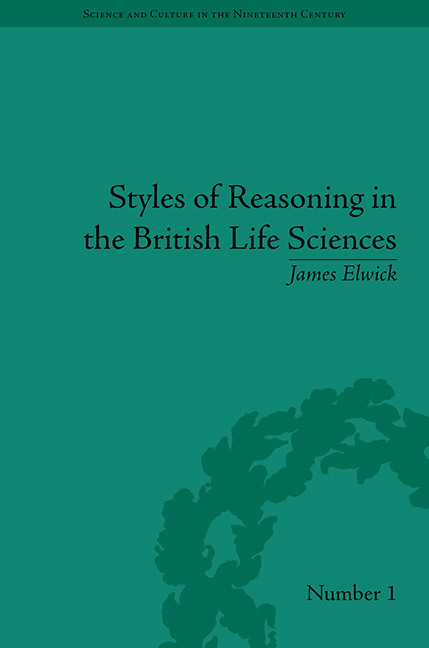Introduction
Summary
This book reconstructs some of the assumptions shared by a group of London life researchers in the thirty-eight years before Charles Darwin's Origin of Species. It sets out to understand some of the questions that intrigued members of this community, looks at the research from their perspective and depicts their various theories and hypotheses as answers to these questions. In so doing it shows them to be part of a larger interlocking system of beliefs. Some are forgotten; others still live on.
This work can thus be seen as a history of a pre-Darwinian mentality in the life sciences. It does differ from earlier studies of mentalities because of its narrow range and focus – covering under forty years, looking only at those in a single city, dealing mainly with those who studied invertebrates. Yet Styles of Reasoning can be seen as a history of a mentality for other reasons. It studies collective and often unarticulated beliefs that formed a backdrop for the individual projects of London life researchers. It investigates many ordinary people too – not peasants or heterodox millers but instead now-forgotten life researchers who wrote textbooks, published in medical journals or taught comparative anatomy and physiology to medical students. These people shared assumptions and similar practices that formed an underlying context; a framework giving explicit theories and definitions their meaning and appeal. Finally, this book shows how many of these shared beliefs often reinforced one another, together forming a coherent system. If certain points were accepted, then one was constrained – though not forced – to accept other points.
These shared presuppositions can be explicated still further, using work from history and philosophy of science: instead of calling them mentalities they are called styles of reasoning. Styles of reasoning are here defined as self-reinforcing beliefs about what counted as good research. More durable than Kuhnian paradigms, they were rules about how one reasoned correctly, tacit positions that channelled researchers into deeming certain kinds of evidence to be more relevant to their investigations.
- Type
- Chapter
- Information
- Styles of Reasoning in the British Life SciencesShared Assumptions, 1820–58, pp. 1 - 10Publisher: Pickering & ChattoFirst published in: 2014



